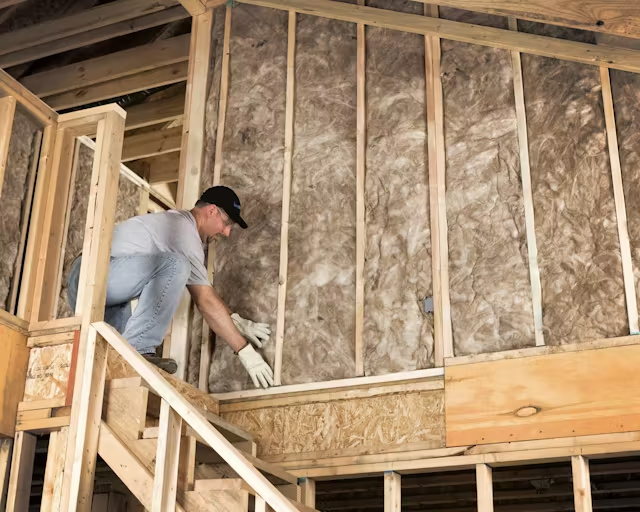Choosing the right insulation for a new home build is one of the most important decisions a homeowner or builder can make. With the intense summer heat and temperature swings in Las Vegas, NV, the insulation you choose significantly affects comfort, energy efficiency, and HVAC system performance. When it comes to new construction insulation, the three most common materials are fiberglass, cellulose, and spray foam. Each has its strengths and weaknesses, and understanding their differences can help you make the most informed decision for your project.
At Attic Insulation Las Vegas, we help property owners and contractors navigate insulation choices to ensure maximum energy efficiency and performance from the start. Here’s a detailed comparison of fiberglass, cellulose, and foam insulation options for new construction.
Why New Construction Insulation Matters
New construction offers the perfect opportunity to install insulation correctly and thoroughly before drywall goes up. Unlike retrofitting an existing home, new builds allow for full access to wall cavities, attics, crawl spaces, and floors. This means insulation can be applied evenly, air gaps can be sealed tightly, and thermal barriers can be maximized for long-term performance.
In a climate like Las Vegas, proper new construction insulation helps reduce HVAC loads, lower energy bills, and ensure indoor comfort year-round. It also allows for the selection of materials that meet or exceed local energy codes and environmental standards.
Fiberglass Insulation: Cost-Effective and Widely Used
Fiberglass is one of the most commonly used materials in new construction insulation. Available in batts and loose-fill (blown-in) form, it’s made of fine glass fibers and is typically installed in walls, ceilings, and attic spaces.
Pros:
- Affordable: Fiberglass is one of the most budget-friendly options, making it attractive for large residential developments.
- Fire-Resistant: Naturally non-combustible, it adds an extra layer of safety.
- Readily Available: Easily sourced and installed by most insulation contractors.
- Good R-Value: Offers an R-value of approximately R-2.9 to R-3.8 per inch.
Cons:
- Air Leakage: While it slows down heat transfer, fiberglass doesn’t seal air leaks on its own.
- Moisture Sensitivity: If exposed to moisture, fiberglass can lose effectiveness and foster mold growth.
- Installation Gaps: If not properly installed, gaps can form around electrical outlets, framing, and piping.
Fiberglass is a reliable choice for new construction insulation when installed by skilled professionals who ensure tight fitting and air sealing around all penetrations.
Cellulose Insulation: Eco-Friendly and Efficient
Cellulose insulation is made from recycled paper products, typically treated with fire-retardant additives. It is usually blown into wall cavities and attics and has gained popularity for its sustainability and performance characteristics.
Pros:
- High Recycled Content: Environmentally friendly, made from up to 85% recycled material.
- Dense and Air-Blocking: Provides better air sealing compared to fiberglass batts.
- Good R-Value: Offers about R-3.2 to R-3.8 per inch, depending on application and density.
Cons:
- Settling Over Time: In walls, cellulose may settle, leading to gaps unless densely packed during installation.
- Moisture Concerns: Though treated for resistance, cellulose can still retain moisture more than other materials.
- Not Ideal for Open Cavities Without Netting: Requires netting or drywall to contain it during new construction.
Cellulose insulation can be a great option for new construction insulation projects where sustainability is a key concern and where dense packing is properly done.
Spray Foam Insulation: Sealing and Insulating in One Step
Spray foam insulation is a high-performance product known for its dual ability to insulate and air seal. It expands on application, filling gaps and cracks to create an airtight barrier. Foam comes in two types: open-cell and closed-cell.
Pros:
- Exceptional Air Seal: Eliminates drafts and drastically reduces air leakage.
- Highest R-Value: Closed-cell spray foam delivers an R-value of about R-6 to R-7 per inch.
- Moisture Barrier: Closed-cell foam adds resistance against moisture and can reinforce structural integrity.
- Longevity: Spray foam doesn’t settle or degrade over time.
Cons:
- Higher Cost: Spray foam is the most expensive insulation type upfront.
- Installation Requirements: Must be professionally installed with proper safety precautions.
- Rigidness (Closed-Cell): Not as flexible, which may be a consideration in some framing systems.
For high-efficiency homes in Las Vegas, spray foam is the premium choice for new construction insulation. Though more costly, the return on investment comes in the form of energy savings, superior comfort, and reduced HVAC strain.
Insulation Performance in Las Vegas’ Desert Climate
The extreme summer heat and low humidity in Las Vegas create a unique set of challenges for insulation. High daytime temperatures, cool evenings, and low rainfall mean insulation must resist radiant heat, maintain consistent indoor temperatures, and prevent air exchange.
In this region, combining insulation types can be a smart approach. For instance:
- Use closed-cell spray foam in the attic and around ductwork to stop air leakage.
- Apply fiberglass batts in interior walls for soundproofing and thermal buffering.
- Add cellulose in dense-packed exterior walls for improved air resistance and sustainability.
Proper new construction insulation installed by a knowledgeable team can help meet local building codes while providing lasting comfort and lower energy bills.
Partner with Attic Insulation Las Vegas
At Attic Insulation Las Vegas, we specialize in evaluating new construction projects and recommending the best insulation material based on your goals, budget, and building plans. Whether you’re leaning toward fiberglass, cellulose, or spray foam, our licensed technicians ensure precise, code-compliant installation for maximum HVAC efficiency and energy savings. We proudly serve all of Las Vegas, NV, with professional insulation services tailored to desert climate conditions. Call us today at (702) 745-7890 or visit atticinsulationlv to schedule your consultation and experience the difference quality new construction insulation can make


